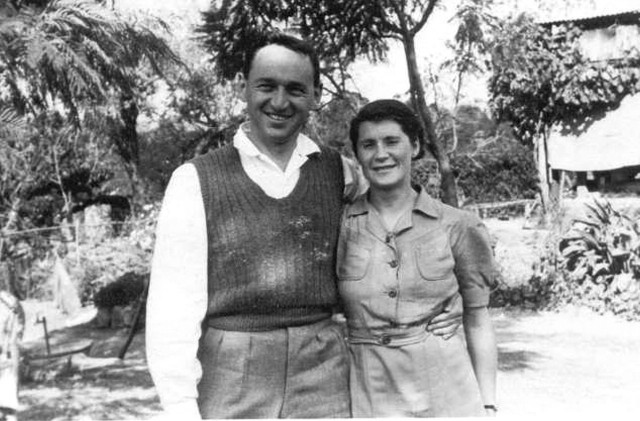WIDELY RECOGNIZED AS ONE of the 20th century’s most original, inspirational, and influential leaders in social medicine, Sidney Kark was born in 1911 in Johannesburg, South Africa, to which his family had emigrated from Lithuania in the 1880s.1 After graduating from high school, Kark entered the medical school at Witwatersrand University in 1929 but was forced to abandon his studies in the early 1930s because of the economic depression. He later returned to medical school and graduated in 1936. While in medical school, Kark was active in a variety of progressive student organizations, including the National Union of South African Students and its affiliated Labor Party.
Several liberal faculty members active in the interracial South Africa Institute of Race Relations influenced Kark, as did a history professor, W. M. MacMillan, whose analysis of South African history highlighted reasons for the poverty and deprivation of the native African populations, and Eustace Cluver, a lecturer in public health.
In 1938, when Cluver was appointed secretary of health of South Africa, he chose Kark as the clinical medical officer for a year-long survey of the health and nutritional state of South African children. After this assignment, he appointed Kark head of a pioneering health unit at Pholela in rural Natal Province. The Health Ministry intended this to be a model for health centers across the country. Sidney Kark and his new wife, Emily, who was also a physician, went to Pholela in 1940. During the 6 years they spent there, they began to develop the concepts, methods, and programs of applied social medicine for which they would later become famous.
Figure.
Drs. Sidney and Emily Kark, Pholela, Natal, circa 1940. Courtesy of Dr. Jeremy D. Kark.
In 1946, Kark moved to the city of Durban to direct the newly created Institute of Family and Community Health (IFCH), whose mission was to train personnel for the large network of health centers on the Pholela model, as projected in the recently released Gluckman Report of the National Health Services Commission.2 Students were trained at Pholela and at 6 new urban health centers, whose populations lived in municipal housing projects, urban slums, and shack settlements. In 1951, a medical school admitting only “Black, Indian, and colored students” was created in Durban.
In 1952, reactionary changes in the national government prevented the growth of the planned health centers and threatened the existence of the IFCH. With the help of the dean of the Durban Medical School and a grant from the Rockefeller Foundation, the IFCH was moved into the Medical School and integrated with the clinical educational curriculum. Kark became professor of family practice and social medicine, and the 7 health centers became teaching sites for Durban medical students.
Given the political climate of the 1950s, Kark and his colleagues at the IFCH realized that their days were numbered and began leaving for posts in other countries. The Karks spent time in Jerusalem and a year in the School of Public Health in Chapel Hill, NC. In 1959, they returned to Jerusalem, initially as part of a 3-year World Health Organization–Israel project to establish a Department of Social Medicine at the Hebrew University Hadassah Medical School. There Kark became professor and head of the Department of Social Medicine, where he served until his retirement in 1980. During this period, he further developed the ideas he had come to call “community-oriented primary care.”3,4 Sidney Kark died in 1998.
John Cassel’s career was closely intertwined with Kark’s but developed in its own unique direction in the field of social epidemiology.5 Like Kark, Cassel was born in Johannesburg, in 1921. He received his medical education, also like Kark, at Witwatersrand. In 1947, he joined the staff of the Durban IFCH and received training at 2 of its health centers. He was then appointed medical officer in charge of the Pholela center, a post he held until 1953. That year, he left for the United States, to study for a master of public health degree at the University of North Carolina at Chapel Hill. He was subsequently asked to join the faculty and became chair of the Department of Epidemiology in 1958.
Building on the ideas to which he had been exposed in South Africa, Cassel became especially interested in the significance of the social environment as a determinant of health in populations. In his teaching and research, he emphasized the importance of social, cultural, and psychological factors. He used North Carolina as a laboratory for epidemiological studies of the impact of change from rural agrarian ways of life to urban industrial living. He then generalized his findings to a model in which “stress factors” were important in the genesis of physical disease whereas social support networks exercised a protective effect. Cassel synthesized many of his most original ideas in a paper entitled “The Contribution of the Social Environment to Host Resistance,” presented as the fourth Wade Hampton Frost Lecture in 1976, the year of his terminal illness and death.6
References
- 1.Kark S, Kark E. Promoting Community Health: From Pholela to Jerusalem. Johannesburg, South Africa: Witwatersrand University Press; 1999.
- 2.Gluckman H. The Provision of an Organized National Health Service for All Sections of the People of the Union of South Africa, 1942–1944. Report of the National Health Services Commission, Chairman Dr. Henry Gluckman. Pretoria, South Africa: Government Printer; 1944.
- 3.Kark SL. Epidemiology and Community Medicine. New York, NY: Appleton-Century-Crofts; 1974.
- 4.Kark SL. The Practice of Community-Oriented Primary Health Care. New York, NY: Appleton-Century-Crofts; 1981.
- 5.Ibrahim MA, Kaplan BH, Patrick RC, Slome C, Tyroler HA, Wilson RN. The legacy of John C. Cassel. Am J Epidemiol. 1980;112:1–7. [DOI] [PubMed] [Google Scholar]
- 6.Cassel J. The contribution of the social environment to host resistance. Am J Epidemiol. 1976;104:107–123. [DOI] [PubMed] [Google Scholar]



